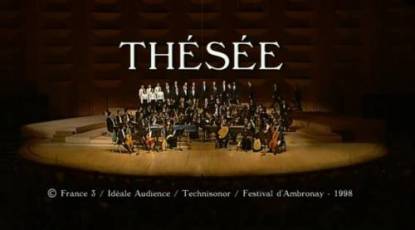Jean-Baptiste Lully – Thésée (1998)
Jean-Baptiste Lully – Thésée (1998)

1. Theseus 2:23:27 Soloist of the Académie du Festival d'Ambronay Ambronay European Baroque Academy William Christie – conductor Auditorium de Lyon (Lyon, France)
Jean-Baptiste Lully was the dominant force in French music during the reign of Louis XIV. His operas reflect the ideas and visions of the king. A good example of this is 'Thésée', which was Lully’s third 'tragédie-lyrique'. It was a resounding success. Its popularity was such that almost thirty performances in the Paris Opéra and in the royal residences are documented between 1675, when the first performance took place, and 1779. It was then taken out of the repertoire by the Opéra as it was considered a bit old-fashioned.
Let me first give a synopsis. King Aegeus of Athens has promised to marry the sorceress Medea. But he falls in love with Aegle, although she loves Theseus, son of the king (although still unrecognized as such), who also loves her. Aegeus strikes a deal with Medea, who has set her eyes on Theseus: she gets him, he gets Aegle. This is summed up in their duet: "Happy are two inconstant lovers when they are inconstant at the same time". But Theseus and Aegle don't want to be split up. Therefore Medea uses all her powers to destroy their love. But it doesn't have the effect she hoped.
Theseus, who has played a crucial role in the defence of Athens against its enemies, is going to be named crown prince at the request of the Athenian people. But when Medea learns that Theseus is in fact Aegeus's son, she talks the king into giving Theseus a poisoned chalice during the ceremony. Only in this way can he avoid losing his power and losing Aegle. But just as he is about to do so he recognizes Theseus by his sword as his own son and makes way for Theseus to marry Aegle. Seeing that her manipulations have had no effect Medea takes revenge: "the palace appears ablaze, and the dishes prepared for the feast change into horrible creatures". The people pray to the gods, and then Minerva appears to put everything right. The opera ends in a duet with chorus, praising the power of love.
Operas in France were written within a specific political and social context. When Philippe Quinault started to write the text, France was in the middle of a war, in which it was threatened from several sides at the same time. This must have inspired Quinault to choose this subject: in the first act we hear how Athens is in the middle of a war, in which Theseus is heroically defending the city against its enemies. The battles are depicted here by choruses of soldiers, who time and again sing: "We must perish, we must perish, we must triumph or die". The orchestra plays with trumpets and timpani. But it is also in this act where Aegle declares her love for Theseus.
Although the opera is named after Theseus its central character is Medea. It is her machinations which decide the course of events. The subject of the opera – the conflict between love and war – is most clearly depicted in the direct confrontation between Medea and Aegle. The first is completely overwhelmed by thoughts of revenge and is willing to do everything to realise her wishes, whereas Aegle is true to her love and is even willing to sacrifice Theseus in order to save his life. The casting of these two roles is very convincing. Laura Pudwell gives a brilliant characterisation of the role of Medea. She has a very strong low register which she uses to great effect to express the anger of Medea. The sharp edges of her voice contrast nicely with the much sweeter voice of Ellen Hargis who gives a moving portrayal of Aegle. Harry van der Kamp does well in portraying the somewhat split personality of King Aegeus, good-hearted and loving on one hand, treacherous on the other. The role of Theseus is less well developed, but Howard Crook – a veteran in French baroque opera – sings that role quite beautifully. The other characters, some of which appear only in one or two acts, are all well cast – in fact, there are no weak links here.
The choir and orchestra deserve special mention. They play a very important role in French baroque opera. The choir, including members of the cast, is excellent and sings with great power and energy. The orchestra is very colourful and plays the instrumental dances with great flair and rhythmic flexibility. Choir and orchestra are decisive in making the most dramatic moments really telling, like the closing scenes when Medea unleashes her full powers to take revenge and Minerva and her followers intervene.
It is understandable that Lully's Theseus was a great success and was regularly performed for more than a century after it was created. It is definitely one of Lully's masterpieces. In general I tend to think that his younger contemporary Charpentier was a greater dramatist, but here Lully demonstrates that he knows how to create a musical drama. And this performance makes that abundantly clear. --- Johan van Veen, musicweb-international.com
download: uploaded anonfiles mega 4shared mixturecloud yandex mediafire ziddu








